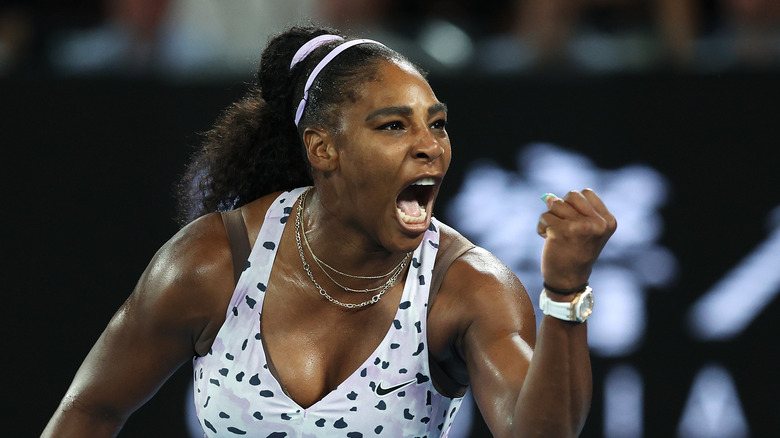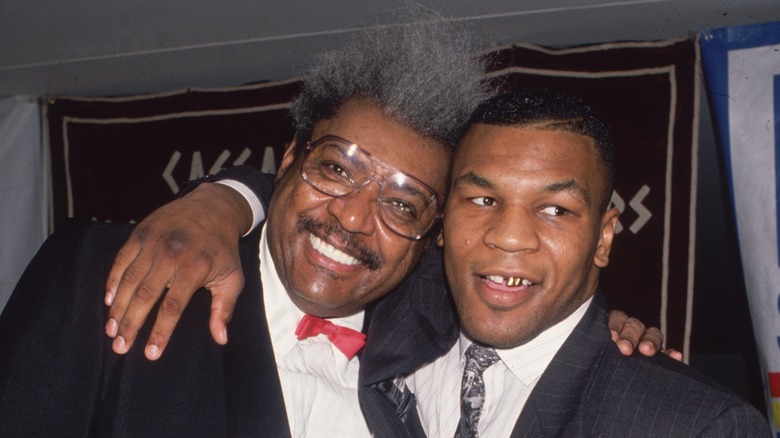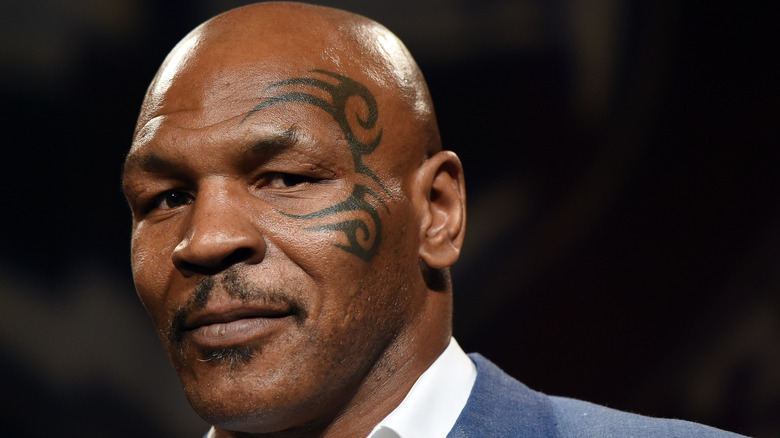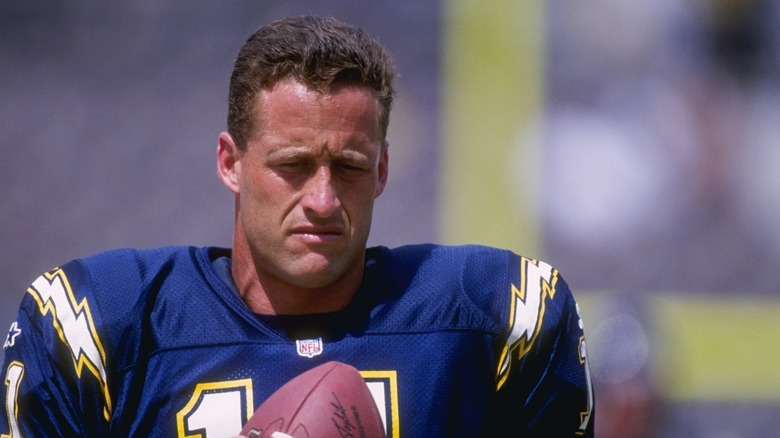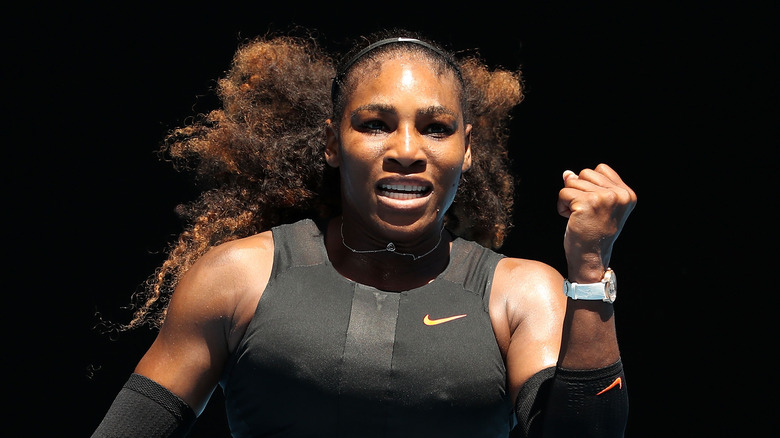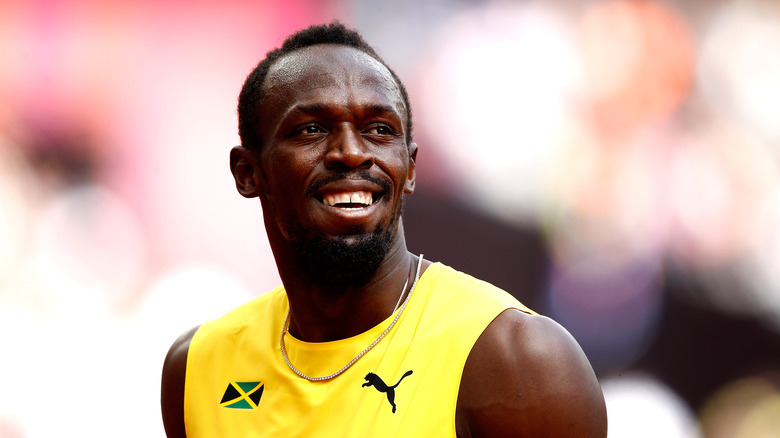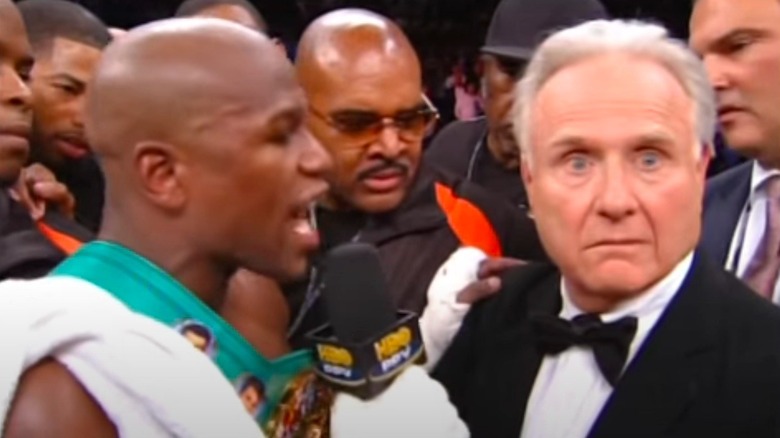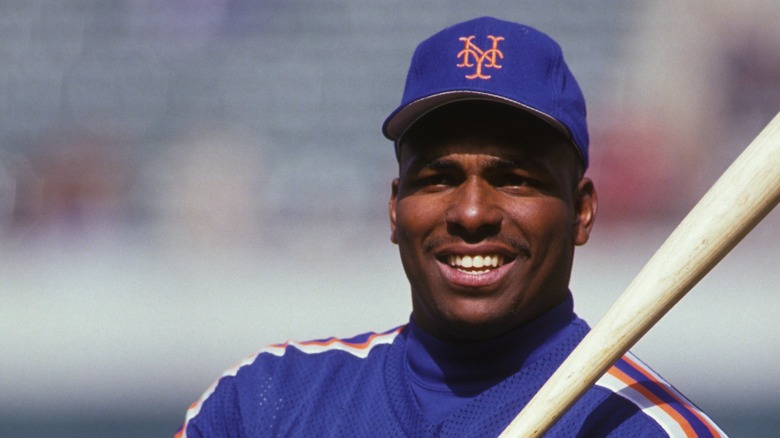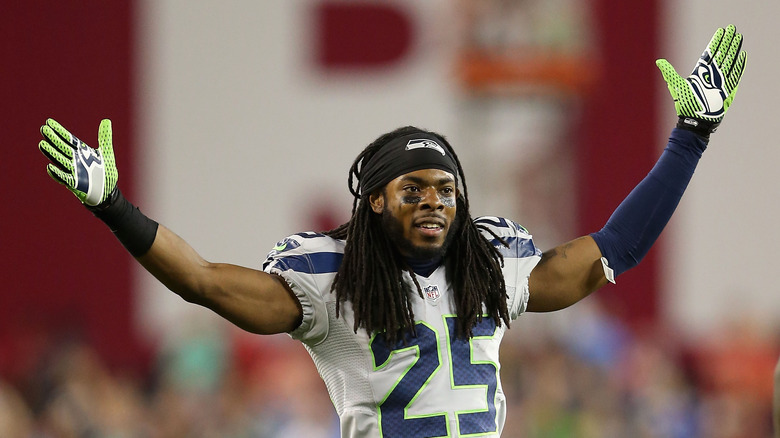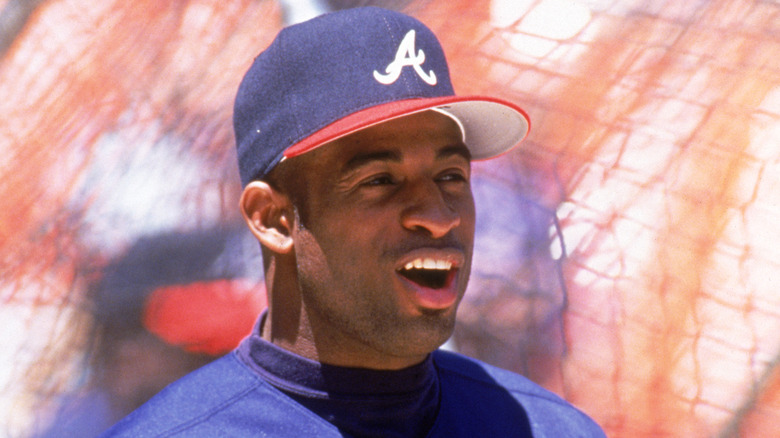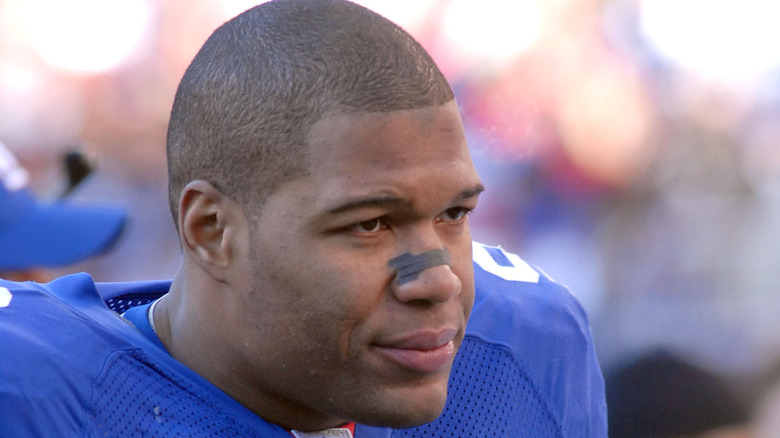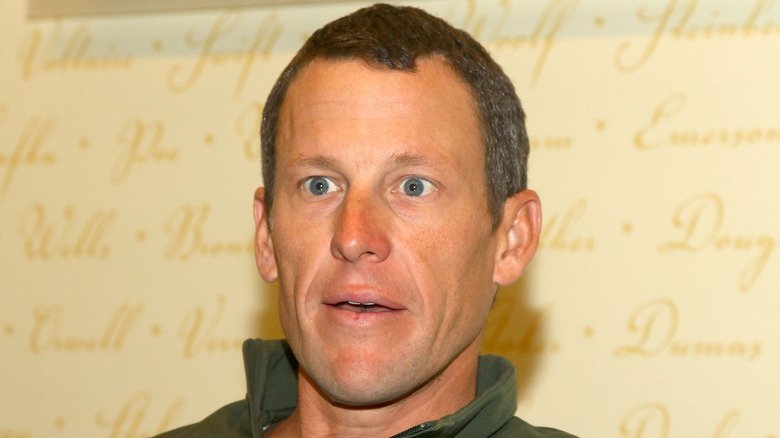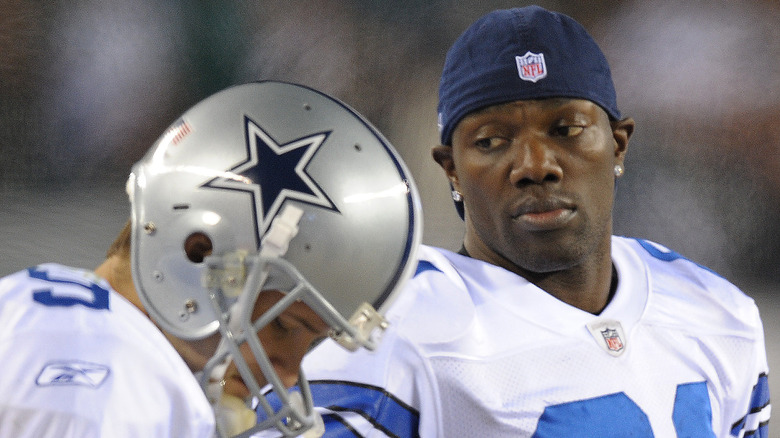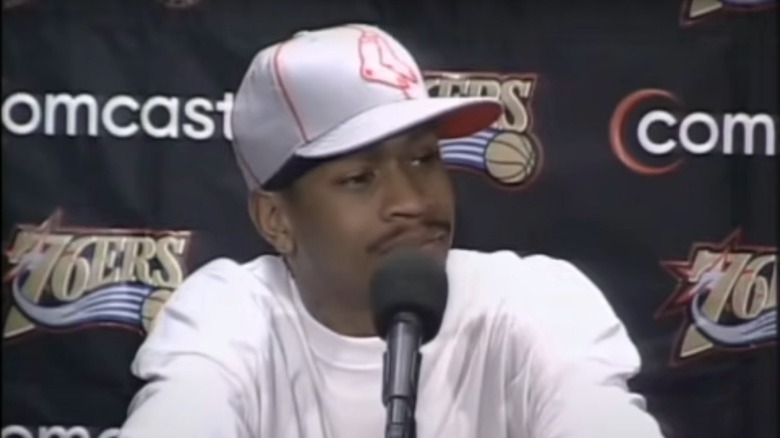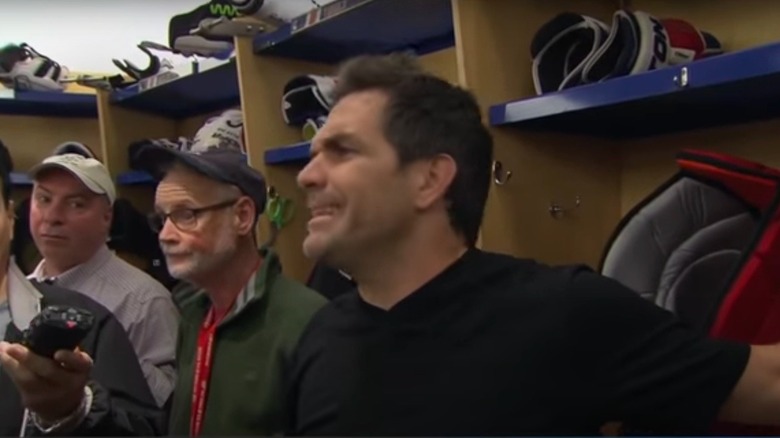Athletes Who Fired Back At Their Interviewers
Athletes and sports reporters have always had a unique and somewhat symbiotic relationship. In fact, it's very different from the relationship that, say, a celebrity might have with an entertainment journalist, or a politician would have with a journalist covering politics. In the world of sports, reporters will often encounter athletes in unguarded moments, in addition to more organized settings such as press conferences, which often results in athletes getting to know those who write about and interview them — and vice-versa. Those interviews often take place after games, a situation that has the potential to become complicated when an athlete's emotions are running high due to a loss or poor performance. This is just one reason why interviews with sports stars have been known to occasionally veer off the rails.
Various factors have been involved in interviews that went wrong, ranging from an interviewer's line of questioning, to previous things an interviewer has previously said or written, to an athlete's own emotional state at that particular moment in time. Whatever the reason, when this happens, big drama is often the result.
For a more comprehensive look, read on further for a rundown of athletes who fired back at their interviewers.
Mike Tyson walked off after recognizing 'scumbag' reporter from previous interview
Back in 1991, there was no fighter more feared in professional boxing than Mike Tyson. In support of an upcoming match, Tyson and boxing promoter Don King appeared via satellite on "A Current Affair," where they were interviewed by journalist Steve Dunleavy. The whole thing got off to a rocky start when Tyson told Dunleavy that he recognized him from a previous interview. "Yeah, you tried to nail my Black ass to the cross!" Tyson declared, leading Dunleavy to laugh uproariously.
Dunleavy then asked Tyson if he'd heard that he was about to be named in a paternity suit; he said he hadn't. Dunleavy then asked if Tyson knew that he was being asked to serve as a witness for another paternity suit, this one involving King's son, Eric King. King bobbed and weaved while cheerily waving a tiny American flag, turning the conversation back to the upcoming fight. Dunleavy was undeterred and continued asking about the paternity suit. "But you're saying that I witnessed Eric [bleep] this girl?" Tyson fired back. King jumped in but was halted by Tyson. "I know Don, but that's bulls***, because you're here to promote the fight. We shouldn't even talk to that scumbag," King said, referring to Dunleavy. "F*** you, we're off the show," Tyson then declared, taking off his microphone pack and walking away.
As he left, Tyson added some pithy parting words for Dunleavy. "F*** you," he repeated.
Mike Tyson called his interviewer a 'piece of s***'
More than 20 years after that notorious sit-down with "A Current Affair," Mike Tyson was no less feisty when he appeared on Canada's CP24 Toronto News. Promoting his one-man show, "Mike Tyson: Undisputed Truth," Tyson was taken aback when anchor Nathan Downer asked about his recent meeting with Rob Ford, Toronto's embattled mayor. "Some of your critics would say, 'You know, there's a race for mayor, we know you're a convicted rapist, this could hurt his campaign,'" Downer said.
Tyson was clearly surprised that his 1992 rape conviction was being resurrected. "I don't have no comment for that, because it's negative and you're being negative ..." Tyson said. While Tyson's promoter, Alex Choko, attempted to talk about Tyson's meeting with local boxing legend George Chuvalo, Tyson interrupted to address Downer. "It's so interesting because you seem like a nice guy but you're really a piece of s***," Tyson said. As Downer attempted to explain himself, Tyson doubled down by uttering a few more profanities. Downer then reminded Tyson they were on live television. "I don't care," Tyson declared. "What are you gonna do about it?"
Downer then shifted gears to ask about Tyson's one-man show, asking him if he found it more "nerve-racking" to perform onstage or to compete in a boxing match. Tyson wasn't having it. "It's more nerve-racking for me to hear us talking to a rat piece of s*** like you," he responded.
Jim Everett went off on Jim Rome for calling him 'Chris Evert'
Back in 1994, New Orleans Saints quarterback Jim Everett was a guest on Jim Rome's ESPN talk show, "Talk2." Things started off affably, until Rome welcomed the athlete as "Chris Evert," jokingly questioning Everett's manliness by referring to him as the female tennis star. "You know what? You've been calling me that for about the last five years," Everett responded.
Everett then warned Rome that if he said it again, he should be prepared to take a station break, stating, "I'll bet you don't say it again." Rome, grinning mischievously, retorted by saying, "I'll bet I do ... Chris." Everett responded by leaping to his feet, upending the table that was between them and pushing Rome to the floor while a production staffer scurried over to break things up. According to a report in The Washington Post, Everett immediately exited the studio.
As Rome told the Post, Everett apologized to one of the producers, recalling that he said, "I've had to listen to this [on Rome's radio show] for three years. I'm sorry. I just snapped." Everett later spoke about his actions during a teleconference and insisted that he had no regrets over his extreme response to Rome's taunting. "Really don't condone my actions, but I was put in a position that I thought was going to be in a journalistic-type interview and, instead, I was put into what I felt was a taunting attack," he said.
Serena Williams interrupted an interview to demand an apology
American tennis phenom Serena Williams had just played in the 2017 edition of the Australian Open when she was interviewed at a press conference. One reporter's question — which referenced her 23 unforced errors during the match — raised the athlete's hackles. "I think that's a very negative thing to say," she responded. "Are you serious?" When the reporter responded by telling her he was just stating what he'd observed, she continued. "Okay, well, you should have been out there," she said. "That wasn't very kind. You should apologize. Do you want to apologize?"
The sheepish journalist responded by telling her that he did, telling Williams that he was sorry. Williams thanked him for his apology and then discussed the match.
Interestingly, Williams made headlines the following year when she demanded another apology. That demand came during her match against Naomi Osaka at the 2018 U.S. Open, when chair umpire Carlos Ramos issued her a warning after her coach, Patrick Mouratoglou, gave her a thumbs-up, claiming she was in violation for receiving coaching during the game. "You owe me an apology," Williams told Ramos, as reported by Sports Illustrated. "I don't cheat to win. I'd rather lose."
Usain Bolt shut down 'disrespectful' question about doping
Superstar Jamaican sprinter Usain Bolt, winner of eight Olympic gold medals, holds the honor of "the world's fastest man" for his unbroken records in the 100- and 200-meter races.
In 2017, Bolt finished in third place in the 100-meter, behind American sprinter Justin Gatlin, who had returned to the sport after an eight-year suspension in 2006 for using performance-enhancing drugs. During the post-race press conference, a reporter pointed out that Gatlin's winning time had been the slowest for a gold medalist since 2003 and asked whether stronger anti-doping measures now in place were responsible. "Whoa, whoa, whoa, what?" Bolt interjected. While Bolt laughed at the question, the reporter elaborated on her theory that more stringent anti-doping regulations had led to slower sprinters. "First of all, I'm sure everybody up here take that very disrespectful," Bolt declared.
"We've worked hard," he continued. "As I said, Justin has done his time through the years, and he's proven himself over and over again." Bolt then explained there are other factors besides drugs that will impact how long it takes to reach the finish line. "There's something called injury, and sometimes everything don't go as smoothly as you want to ... there's negative wind, there's so much ... so for you to just directly say something to all three of us, I take that disrespectful ... Yes, it's slow, but we came out and we put on a good show."
Floyd Mayweather Jr. lashed out at reporter Larry Merchant after fight
Boxer Floyd Mayweather Jr. has faced many formidable opponents in the ring, but after one match wound up facing an unexpected adversary: veteran ringside reporter Larry Merchant of HBO Sports. After the fighter's 2011 knockout win against Victor Ortiz, Merchant interviewed Mayweather. While questioning Mayweather, he called him out for a controversial head-butt, and also accused him of taking some unfair shots at Ortiz.
After thanking God for his win, Mayweather claimed that Ortiz had hit him with "a dirty shot." Merchant, however, continued to contend that Mayweather took advantage of his opponent by delivering a knockout punch when Ortiz had his guard down, his hands at his sides after they'd touched gloves while apparently unsure whether the round was over. "We're not here to cry and complain about what he did dirty or what I did dirty, I was victorious. If he want a rematch, he can get a rematch," Mayweather replied.
Merchant, however, was not satisfied by Mayweather's answer and doggedly kept at his line of questioning until the boxer became fed up, demanding to be interviewed by someone else. "You never give me a fair shake! HBO needs to fire you! You don't know s*** about boxing! You ain't s***!" Mayweather shouted. Merchant, who was 80 at the time, issued a now-legendary response. "I wish I was 50 years younger and I'd kick your ass!" he retorted.
Bobby Bonilla threatened reporter in locker room: 'I'll hurt you'
New York Daily News reporter Bob Klapisch had co-authored a highly critical book about the New York Mets' disastrous 1992 season, "The Worst Team Money Could Buy," when he stepped into the team's locker room after a 1993 loss to the Houston Astros.
One of the players to have been portrayed negatively in the book was slugger Bobby Bonilla. Bonilla was not pleased to see Klapisch, and made his feelings about the reporter known when he began goading him into a physical confrontation. "Any time Bobby, I know you're feeling an itch. Make your move ... because I'll hurt you," Bonilla said. When Klapisch asked if Bonilla was threatening him, the athlete responded, "Whatever, you take it as you see, it's just like the homeboy said back home, we're just chilling. Make your move." Bonilla was then restrained by Mets public relations director Jay Horwitz before any fisticuffs could take place.
As Klapisch later told UPI, Bonilla had also issued a not-so-veiled threat by telling him, "I'll show you the Bronx." Klapisch chastised Bonilla and criticized the team for not controlling him. "Players can't be allowed to threaten writers," Klapisch said. The journalist also spoke to The New York Times, insisting he wasn't sure why Bonilla was so angry at him. "I don't know where this is coming from; if it's something to do with the book, he hasn't told me," Klapisch said.
Richard Sherman went off on Erin Andrews during fiery interview
Seattle Seahawks cornerback Richard Sherman had just tasted victory, beating the San Francisco 49ers in the 2013 NFC Championship Game when he was interviewed by ESPN's Erin Andrews. The post-game interview immediately went off the rails when Andrews asked Sherman to take her through the final play. Sherman ignored Andrews' question, and instead launched into a feisty rant about 49ers wide receiver Michael Crabtree, the intended target of a pass that was intercepted by Sherman, which won the game and sent the Seahawks to the Super Bowl.
"Well, I'm the best corner in the game! When you try me with a sorry receiver like Crabtree, that's the result you're gonna get!" Sherman yelled while angrily addressing the camera and then shouting, "Don't you ever talk about me!" Andrews tried to clarify by asking him, "Who was talking about you?" Sherman yelled, "Crabtree! Don't you talk about the best! Or I'm gonna shut it for you real quick. L.O.B." L.O.B., for the uninitiated, is an abbreviation for "Legion of Boom," the nickname given to the formidable Seahawks trio of Sherman, center fielder Earl Thomas, and safety Kam Chancellor.
Looking back at that moment during a 2020 interview with The Ringer's "10 Questions with Kyle Brandt," Andrews revealed she'd known Sherman was angry that Crabtree had allegedly been trash-talking him, but viewers didn't. "I actually thought, people are going to think he's freaking yelling at me, and he's not," she explained.
Deion Sanders doused interviewer with ice after critical comments
During the 1992 MLB National League Championship Series, Deion Sanders — also known by his nickname, Prime Time — was in the rare position of simultaneously playing for two different teams, in two different sports: outfielder for the Atlanta Braves in baseball, and cornerback for the NFL's Atlanta Falcons. When he attempted to make history by playing in an NFL game and an MLB game on the same day, he was criticized by baseball analyst Tim McCarver, who felt Sanders abandoned the Braves during a crucial time in the season and may have even breached his contract with the team. Sanders retaliated when he spotted McCarver in the locker room after a game and proceeded to douse him with a few tubs of ice water. "You are a real man, Deion, I'll say that," said McCarver sarcastically.
McCarver later discussed the incident during a conference call, as reported by The Los Angeles Times. "I thought it was a deliberate, cowardly act," McCarver complained. Sanders begged to differ. "How can you be a coward for throwing water on someone?" Sanders said in an interview with TNT, adding, "He's flat-out ignorant. He's more of a coward."
During a 2019 appearance on "The Dan Patrick Show," Sanders revealed that his ice-dumping came about because his mother had been angered by reading McCarver's comments about her son. "When you make somebody's mama mad, you gotta handle it," Sanders explained, "and I handled it."
Michael Strahan fired back after interviewer's 'negative' question
Before he began conducting interviews as a TV host, Michael Strahan's previous gig as a defensive end for the New York Giants meant that he was the interviewee. That was the case in 2006 when ESPN's Kelly Naqi asked him about some disparaging comments he'd made about teammate Plaxico Burress. That question led Strahan to explode in an angry tirade, in which he seemingly went out of his way to embarrass Naqi. "Come here, I want to see your face when you ask this question," he told her. "You're a responsible journalist, look me in the eye and ask this question the way you want to ask it. Look a man in the eye before you try to kill him or make up something."
He continued by scolding Naqi for what he characterized as an attempt to cause a rift in the team. "So if you want to come here with a negative, you're coming to the wrong guy," he said, chiding her for the negative tone of her question for him. "Ask me a question in the appropriate manner," he demanded.
When Strahan was later taken to task for his apparent bullying of a female journalist, he refused to apologize. "And if anybody's waiting for me to apologize and they're holding their breath, then I suggest they call a paramedic because it's not going to happen," he said during a W-FAN radio interview, as reported by ESPN.
Lance Armstrong told an interviewer he was 'not worth the chair you're sitting on'
Lance Armstrong's infamous doping scandal was several years away when he attended a press conference for the 2009 Amgen Cycling Tour of California. Things became testy when Irish journalist Paul Kimmage asked Armstrong about inviting cyclists who'd previously tested positive for banned performance-enhancing drugs. "What is it about these dopers that you seem to admire so much?" Kimmage asked. Armstrong already had beef with Kimmage after a radio interview in which he accused Armstrong of hiding behind his recent battle with testicular cancer. "Well, he is the cancer in this sport," Kimmage said, via The San Diego Union-Tribune. "For two years, this sport has been in remission. And now, the cancer's back."
Armstrong addressed Kimmage's earlier comments by paraphrasing them, and then explained why he refused to grant him an interview. "I think it goes without saying, no, we're not going to sit down and do an interview. And I don't think anybody in this room would sit down for that interview," Armstrong said. He then personally attacked Kimmage. "You are not worth the chair that you're sitting on, with a statement like that, with a disease that touches everybody around the world," he added.
In 2012, the United States Anti-Doping Agency investigated Armstrong and found him guilty of doping. He received a lifetime ban from competing in the Olympics and was stripped of all seven of his Tour de France wins.
Terrell Owens broke down in tears defending QB Tony Romo
In 2008, the Dallas Cowboys had just suffered a particularly painful loss to the New York Giants in the divisional playoffs when Cowboys wide receiver spoke with reporters. Owens, his eyes hidden behind large aviator-style sunglasses, fought back tears as he defended quarterback Tony Romo. "It's not about Tony. You guys can point the finger at him. You can talk about the vacation, and if you do that, it's really unfair," he said, referencing the controversy generated when Romo spent his week off prior to the game vacationing in Cabo San Lucas with then-girlfriend Jessica Simpson.
Owens' voice cracked as he became even more emotional, and then began full-on sobbing. "Really unfair," he reiterated. "That's my teammate. That's my quarterback ... We lost as a team. We lost as a team, man."
Owens defended his emotional response, telling reporters he recognized that even though it was the team that lost, the media would pin the blame on Romo and his ill-advised Mexican holiday. "I always had a good relationship with my quarterbacks," Owens said, as reported by The New York Times. "I know the type of person I am on the inside. You guys judge me on the outside."
Allen Iverson blasted sports journalists in infamous 'practice' rant
The 2001-2002 NBA season was a rough one for the Philadelphia 76ers, who never made it past the first round of the playoffs. During a press conference, reported tensions with head coach Larry Brown bubbled over when star player Allen Iverson responded to a reporter's question about his dedication to practice — the source of his conflicts with Brown.
"We sitting in here — I'm supposed to be the franchise player, and we in here talking about practice," Iverson fired back. "I mean, listen, we talking about practice. Not a game ... We talking about practice. Not a game. Not the game that I go out there and die for and play every game like it's my last. Not the game. We talking about practice, man."
While that rant has gone on to become legendary, journalist Kent Babb's book, "Not a Game: The Incredible Rise and Unthinkable Fall of Allen Iverson," suggested that Iverson was drunk when he unleashed his tirade. Iverson subsequently appeared on ESPN's "First Take" and denied Babb's claim of drunkenness. He also told host Stephen A. Smith (as reported by ESPN) that there was a lot going on behind the scenes. "They had no idea my best friend had just got killed," he said. "The press conference wasn't about practice. It was about me being [possibly] traded from Philadelphia. Nobody ever talked about that, never heard why I was upset or what the conference was about."
NY Rangers star Dan Boyle insulted reporter: 'Nobody likes you'
Canadian defenseman Dan Boyle was playing for the NHL's New York Rangers when a locker-room interview took an ugly turn. Boyle had been the subject of criticism from New York Post columnist Larry Brooks and let Brooks have it when he eyed him in the locker room.
"I want you out of here," Boyle told Brooks. "Nobody likes you. Nobody respects you ... At least I'm leaving here with the respect of my teammates. Instead of [bleep] someone like you, who tries to bury somebody. That's all you do. It's not a critique. I'm telling you I don't want you here. I have no respect for you. I want you to get the [bleep] out ... I can tell you to get the [bleep] out if I want to ... Why would I be polite with you, are you kidding me?"
Boyle subsequently spoke with Yahoo! Sports about his treatment of Brooks. Insisting his behavior was justified, Boyle said he was standing up for his teammates over Brooks' relentlessly negative reporting on the Rangers. "Not everyone has tough skin. Some guys get affected by that, and it really bothers me," Boyle explained. His only regret, he added, was that the altercation took place in public, as he would have preferred to have spoken with Brooks privately, behind closed doors. "So I apologize to everyone else that was there," Boyle said, "but not to him because I meant every word."

